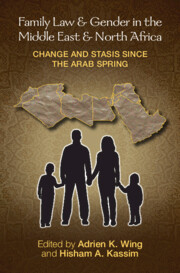Book contents
- Family Law and Gender in the Middle East and North Africa
- Family Law and Gender in the Middle East and North Africa
- Copyright page
- Contents
- Contributors
- Acknowledgments
- Introduction
- 1 Sustained Reforms
- 2 Family Law in Egypt
- 3 Women’s Rights in the Moroccan Family Code
- 4 Postponing Equality in the Algerian Family Code
- 5 Juristic and Legislative Rulemaking
- 6 The Status of Muslim Women in the Mosaic of Islamic Family Law in Lebanon
- 7 In Circles We Go
- 8 The Palestinian Minority in Israel
- 9 West Bank and Gaza Personal Status Law
- 10 Qatari Family Law, When Custom Meets Shari′a
- Glossary
- Bibliography
- Index
1 - Sustained Reforms
Family Law in Tunisia
Published online by Cambridge University Press: 18 May 2023
- Family Law and Gender in the Middle East and North Africa
- Family Law and Gender in the Middle East and North Africa
- Copyright page
- Contents
- Contributors
- Acknowledgments
- Introduction
- 1 Sustained Reforms
- 2 Family Law in Egypt
- 3 Women’s Rights in the Moroccan Family Code
- 4 Postponing Equality in the Algerian Family Code
- 5 Juristic and Legislative Rulemaking
- 6 The Status of Muslim Women in the Mosaic of Islamic Family Law in Lebanon
- 7 In Circles We Go
- 8 The Palestinian Minority in Israel
- 9 West Bank and Gaza Personal Status Law
- 10 Qatari Family Law, When Custom Meets Shari′a
- Glossary
- Bibliography
- Index
Summary
This chapter offers an overview of the sustained reforms of Islamic family law that occurred in Tunisia from the 1950s to 2020. Organized historically, it traces developments during major time periods starting with the end of colonial rule in 1956 and ending with the aftermath of the 2010/11 Arab Spring that ushered a process of democratization in the last decade. Considering marriage, divorce and custody, we present the reforms that placed Tunisia at the vanguard of the Arab world in regard to liberalizing family law and women’s rights. We argue that sustained reforms were possible because succeeding regimes found it in their best interests to pursue a reformist policy. Since most reforms were initiated by state builders and state actors, we refer to them as “politics from above” in contrast to the “politics from below” that started in earnest with women’s activism in the later periods.
- Type
- Chapter
- Information
- Family Law and Gender in the Middle East and North AfricaChange and Stasis since the Arab Spring, pp. 23 - 42Publisher: Cambridge University PressPrint publication year: 2023

